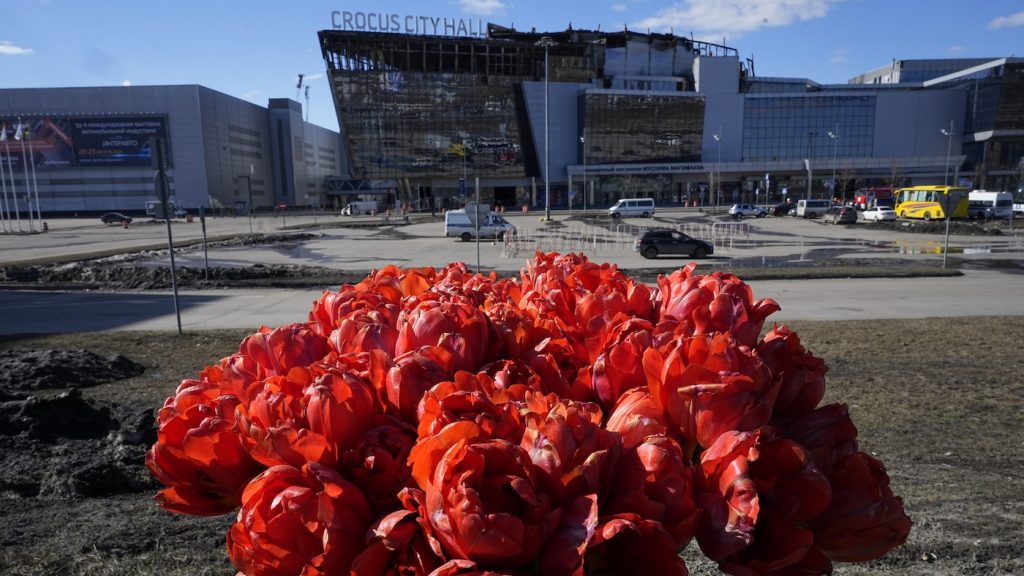The recent ISIS-K attack at a Moscow music venue has sparked concerns that the terrorist group, which used to operate mainly in Afghanistan, might now carry out attacks in the United States and Europe sooner than expected.
The offshoot of the Islamic State known as ISIS-K, which originates from Central Asia, claimed responsibility for the deadly attack at the Crocus City Hall theater in Moscow, where four gunmen killed at least 143 people and injured over 100 just before a concert on March 23.
This high-profile attack, the deadliest in Russia in 20 years, is particularly alarming considering that the group previously had limited capacity to carry out attacks beyond the Middle East. Experts caution that the rapid expansion of ISIS-K's attack range should be taken seriously.
Michael Kugelman from the Wilson Center in Washington, D.C., expressed concern, stating that while he's hesitant to label it an imminent threat to the U.S., the link between ISIS-K and plots extending beyond Afghanistan and into Europe is quite worrisome.
Established in 2014, ISIS-K aims to establish a Muslim caliphate across several countries in Central Asia. The group, known for its extreme cruelty, was formed by dissatisfied Taliban militants from Afghanistan and Pakistan who later began recruiting more widely from Central Asia.
Following the loss of its caliphate in Iraq and Syria in 2017, ISIS-K suffered further setbacks due to NATO Airstrikes in 2018.
Despite this, ISIS offshoots have continued to spread to unchecked areas around the world, as stated by Kabir Taneja from the Observer Research Foundation. While many people may not pay much attention to regions where ISIS has continued to thrive, its affiliated groups in various parts of the world have been slowly gaining prominence, according to Taneja..
Kugelman suggested that ISIS-K is probably the most active and powerful regional affiliate of the Islamic State at present.
ISIS-K has primarily targeted Afghanistan, including the devastating bombing at Hamid Karzai International Airport in Kabul in August 2021, which resulted in at least 183 deaths.
This bombing, which included numerous civilian and military casualties, brought attention to the group's threat, according to Kugelman.
Other significant attacks include a suicide bombing outside the Russian embassy in Kabul in September 2022, as well as dual suicide bombings in Kerman, Iran, in January 2023, resulting in nearly 100 deaths at a ceremony commemorating the deceased Qassem Soleimani, former head of Iran’s Quds Force.
The United States firmly considers the group to be a continuing danger. U.S. Central Command leader Gen. Michael Kurilla cautioned lawmakers last March that ISIS-K was quickly increasing its capability to carry out attacks in Europe and Asia.
He said attacks in the United States were less likely, but he predicted that ISIS-K could target U.S. and Western interests outside Afghanistan within six months and with little or no warning.
In September 2023, the Department of Homeland Security published its yearly threat assessment, stating that the U.S. was at “high risk” for a terror attack, pointing to ISIS-K as a probable perpetrator.
After the Moscow attack, Italy and France raised their security levels, and Europe has been on high alert.
ISIS spokesperson Abu Huthaifa al-Ansar urged followers to attack “crusaders,” especially in Europe and the United States. The message was released on the 10th anniversary of when ISIS first announced its caliphate in Iraq and Syria.
U.S. officials continue to be cautious about the changing threat posed by groups like ISIS-K and other terrorist organizations.
“The Department of Defense has not taken its eye off of ISIS,” said Pentagon press secretary Maj. Gen. Pat Ryder.
However, Washington's ability to gather intelligence against ISIS-K and other extremist groups in Afghanistan has been reduced due to the U.S. withdrawal from the country in 2021.
“When the United States left Afghanistan more than two years ago, it was clear that ISIS-K was a significant threat and that the threat would increase in the absence of the U.S.,” said the Atlantic Council’s Amb. Nathan Sales, a former coordinator for counterterrorism at the State Department.
He added: “I think we’re in a very difficult position right now in terms of our ability to gather useful intelligence on the group, let alone take action. We simply don’t have the necessary resources in Afghanistan to gather intelligence and take action, and that’s a very frightening situation given that ISIS-K is developing the capabilities to carry out attacks on their enemies.”
That thinking has been embraced by Sen. Marco Rubio (R-Fla.), who last week linked the Moscow attack to U.S.-Mexico border policy, stating on ABC’s “This Week” that it was “common sense” for a for-profit human smuggling group with reported links to ISIS to use their network to bring operatives into the country.
“I’m not claiming there’s an imminent threat to the U.S., but I am saying that border situation and the existence of that network is a threat to the United States,” said Rubio, the vice chair of the Senate Intelligence Committee.
Sales mentioned that while the insecure southern border is a genuine concern, it's not the only worry.
“We also have to be worried about terrorists entering the country through other means, such as obtaining a visa at a consulate overseas or exploiting a vulnerability in the visa waiver program to travel to the U.S. without a visa check,” he said. “There are several ways that terrorists could use to carry out attacks here in the country.”









